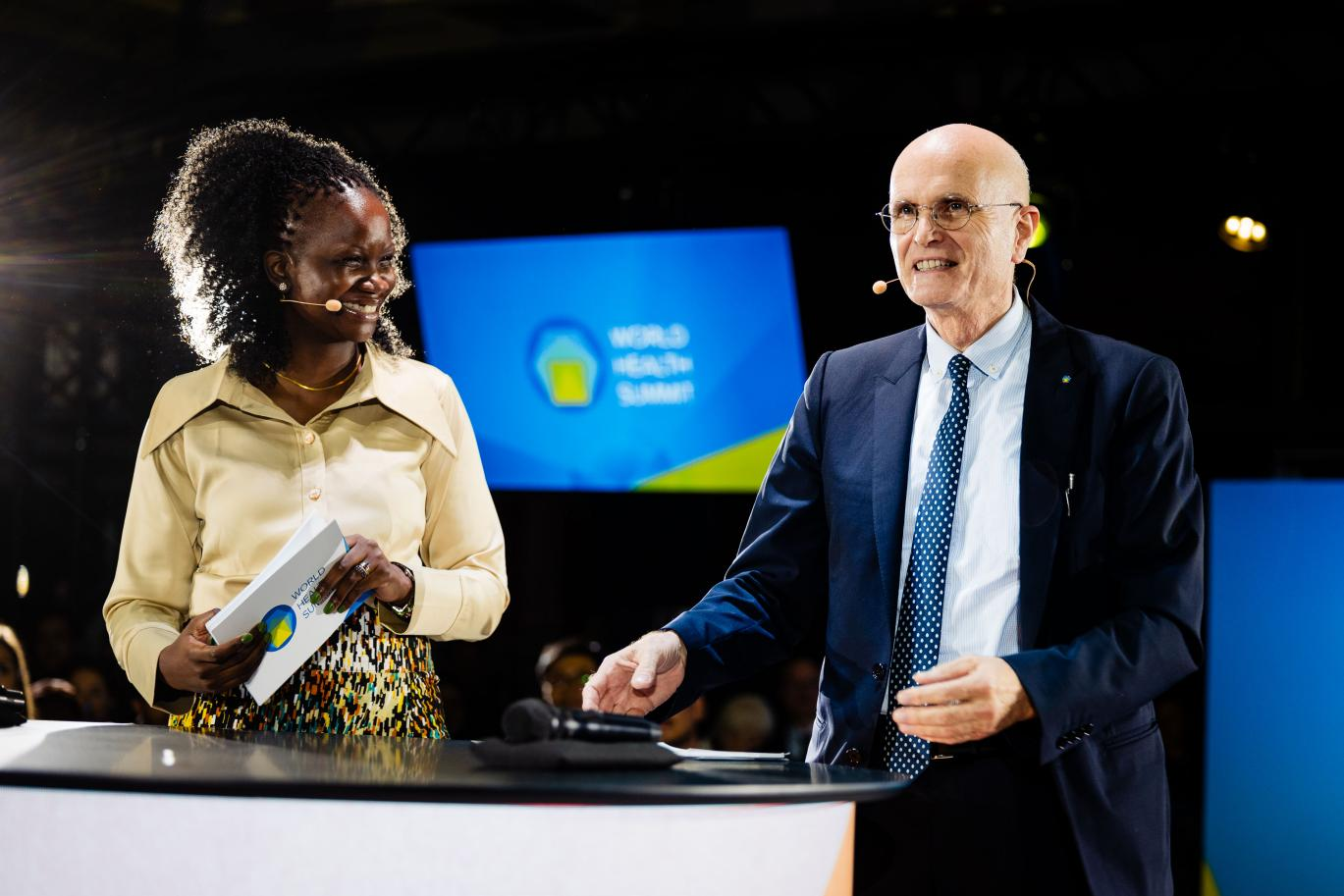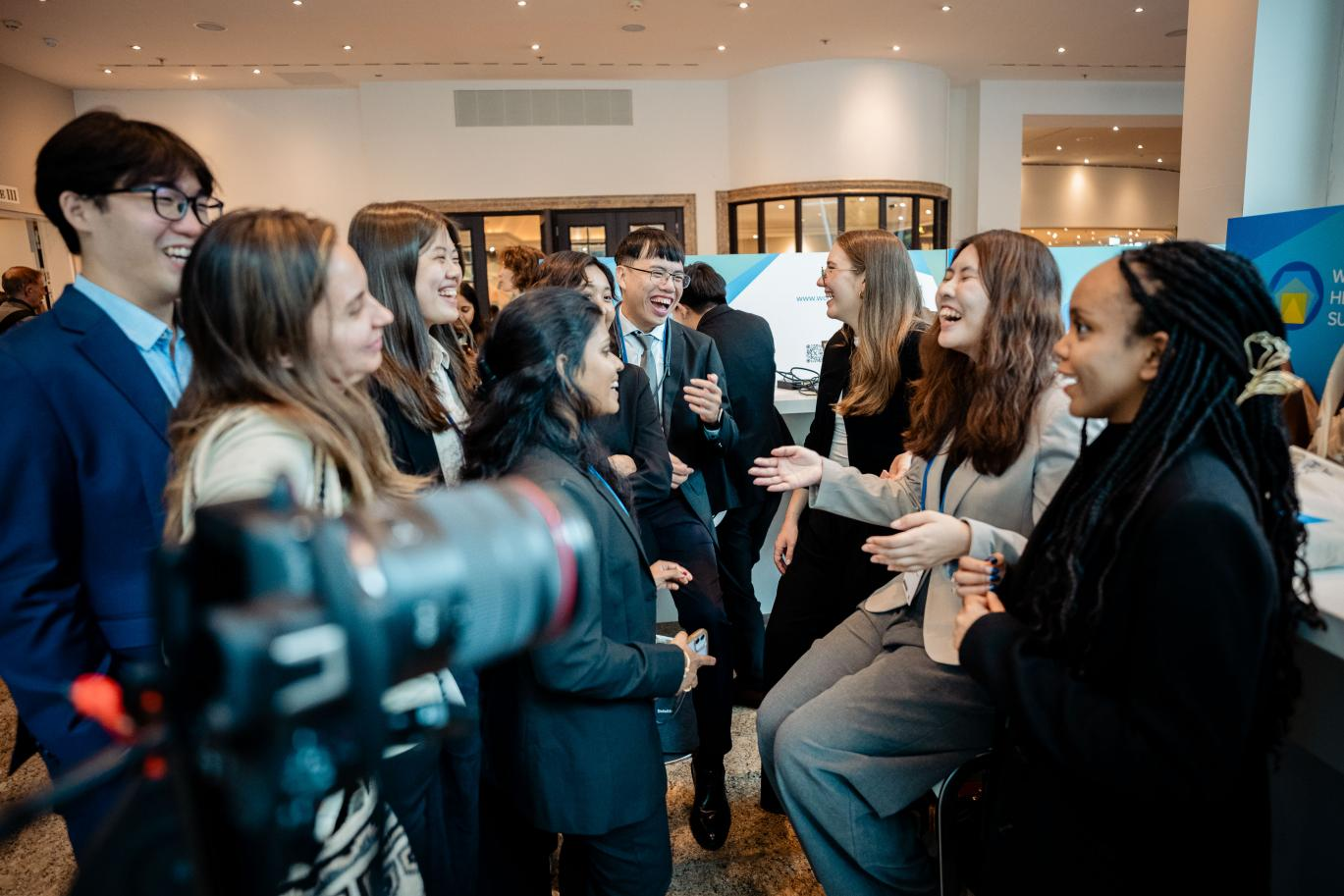Shared responsibility in global health: a conversation with Prof. Dr. Axel R. Pries, President of the World Health Summit
Inside the Summit: How Collaboration Takes Shape
With over 85 parallel sessions and representatives from multiple sectors, how did you, as President, design the agenda to align with the core theme of "Health Responsibilities in a Fragmented World" for the 2025 WHS?
Designing the agenda around the leitmotif "Taking Responsibility for Health in a Fragmenting World" was driven by the recognition that the global health landscape is undergoing profound transformation. New actors, shifting power dynamics, and overlapping mandates have created both challenges and opportunities, making a resilient, inclusive, and coordinated global health system more important than ever. All players - academia, politics, the private sector and civil society - bear responsibility to drive this transition in a positive direction.
With over 400 speakers and over 4000 participants from 144 countries, the program was composed by our team to reflect diversity and to encourage genuine collaboration across science, politics, civil society, and the private sector. Emerging threats such as the climate crisis, and the growing burden of noncommunicable diseases demand integrated, cross-sectoral responses. No one is safe, until everyone is safe – these challenges know no borders.
To make the World Health Summit as impactful as possible, we designed a range of formats including high-level panels, interactive workshops, keynote sessions, and networking opportunities. These session formats enabled participants to exchange insights, develop partnerships, and identify actionable actions.
Importantly, the agenda was closely aligned with the WHS Academic Alliance Assembly, ensuring that academic rigor and regional expertise are included in each discussion. By bridging governance, financing, and equity, the WHS 2025 operationalized its core mission, to overcome fragmentation through shared responsibility.

Prof. Dr. Axel R. Pries, right. Photo: World Health Summit (WHS)
German Chancellor Friedrich Merz emphasized in his address "the urgency of assuming responsibility for the common good." How is this concept reflected in the specific topics and sessions of the summit?
The call to "assume responsibility for the common good" resonates deeply throughout the World Health Summit's program and our overarching mission. At its core, the common good we champion at the WHS and share with all our speakers and participants is health as both a universal human right and a shared global responsibility. In a world marked by growing fragmentation, emerging health threats, and shifting geopolitical dynamics, the WHS stands as a vital platform that embodies shared responsibility and allows discussion among all stakeholders.
The WHS 2025 agenda reflects this commitment by building bridges across sectors and disciplines - uniting leaders from science, politics, civil society, and the private sector. Together, we promote innovative, evidence-based solutions to pressing health priorities such as pandemic preparedness, climate resilience, antimicrobial resistance, and noncommunicable diseases. This cross-sectoral collaboration underscores that health challenges transcend borders and can only be addressed through shared responsibility for the common good.
In doing so, the World Health Summit gives concrete meaning to Chancellor Merz's appeal: bringing together a global community united in purpose, mobilizing knowledge, resources, and partnerships to safeguard and advance health as a universal common good.
Rethinking Health Governance
You mentioned in a podcast that "prevention is more urgent than ever." Given that global resource allocation for infectious disease prevention and non-communicable disease control remains imbalanced, how will the summit promote synergy between the two?
The World Health Summit provides a platform to bridge infectious disease prevention and noncommunicable disease (NCD) control, recognizing that both are interlinked and must be addressed through integrated strategies rather than competing priorities.
The global health landscape is changing: countries are confronting a growing NCD burden fueled by climate change, urbanization, and aging populations, partially reflecting the success in suppressing infections. However, this should not lead to an underestimation of infectious disease threats and the importance of surveillance, management, and preparedness. The exact approaches have to be co-designed by diverse sectors, from science and policy to technology and finance – exactly this is catalyzed by the Word Health Summit.
Through its sessions and working groups, including the WHS Academic Alliance, the WHS encourages evidence-based policymaking, joint financing approaches, and innovations that serve both infectious and noncommunicable disease agendas. Prevention is a necessity for both infections and non-communicable diseases; it is not a siloed effort. Moreover, it is a shared investment in health systems, resilience, equity, and long-term health security.
Weak public health systems in developing countries are a prominent issue. How will the summit leverage the resources of the WHS Academic Alliance to build platforms for collaborative engagement?
Strengthening public health systems, particularly in low- and middle-income countries, stands at the heart of the mission of the World Health Summit’s and the WHS Academic Alliance to advance global health as a shared responsibility. In a rapidly changing, world where traditional global health structures are under pressure, the Alliance offers a model for collaborative engagement. By connecting regional centers of excellence and fostering South–South and South–North partnerships, it builds lasting capacity for research, education, and implementation in the places where it is needed most.
Through joint initiatives on topics ranging from children’s health to health diplomacy, the Academic Alliance creates opportunities for co-developing evidence-based solutions and strengthening local health systems. Its members work together to translate knowledge into action. The WHS Academic Alliance not only acts as a network of expertise, but as a platform for shared leadership, bridging science, policy, and practice to build resilient, inclusive health systems worldwide.
In this context, it is very relevant that the Academic Alliance is a dynamic and growing group. While the Chinese Academy of Medical Sciences & Peking Union Medical College has been a member for many years, the Li Ka Shing Faculty of Medicine, of the University of Hong Kong and the Peking University Institute for Global Health and Development joined the alliance recently.
China's Role and Innovation Collaboration
The concept of "a Global Community of Health for All" proposed by China has become a key consensus in global health cooperation. What synergies do you see between this concept and the "cross-sectoral collaboration" championed by the summit?
The notion of a "Global Community of Health for All" reflects values that also underpin the World Health Summit's mission. We need to ensure good health conditions for everyone, everywhere on this globe as a humanitarian goal but also as the basis for peace and prosperity.
Advancing health will be achieved through shared responsibility, solidarity, and collective action. Emerging global threats, ranging from pandemics to the climate crisis, need integrated, cross-sectoral responses that transcend borders and institutional boundaries. The WHS is the platform to build bridges and bring together regions and sectors to drive innovation and ensure that progress in health leads to equitable outcomes for all. Within this framework, the WHS Academic Alliance serves as a practical embodiment of these synergies. The Alliance connects global centers of excellence to co-develop knowledge, strengthen training, and promote solutions that reflect both global solidarity and local leadership.

Photo: World Health Summit
China has numerous practices in areas such as providing Chinese medical innovation products as global public goods and the China-Africa paired hospital cooperation, alongside the accelerated global expansion of its medical technology companies. Does the summit plan to establish dedicated forums related to China?
The World Health Summit is committed to fostering an inclusive, global platform where experiences, innovations, and best practices from all regions and countries can be shared and scaled. While we do not plan to establish a forum dedicated exclusively to one country, like for example China, the WHS actively ensures that initiatives such as Chinese medical innovations, China-Africa hospital partnerships, and contributions from Chinese medical technology companies can be integrated into the broader program.
In addition, the annual Summits in Berlin are complemented each year by a Regional Meeting held in a different part of the world, where regional health priorities take center stage. In 2026, the Regional Meeting will take place in Africa, hosted by Kenya, highlighting the continent’s leadership and innovation in health. The following year 2027, the Regional Meeting will be held in Hong Kong, organized by the University of Hong Kong supported by the Peking Union Medical College. This Regional Meeting assures that the contributions of China, alongside those of other countries, are highlighted in the context of collective action to advance global health equity and shared responsibility.
Chinese medtech companies face challenges related to standards adaptation during import substitution and global expansion. Can the summit promote the establishment of a "Global Guide for Innovative Technology Landing" to reduce market entry barriers?
The World Health Summit provides a neutral, multi-stakeholder platform where challenges and opportunities for global health are discussed. When it comes to global health innovation, topics such as regulatory standards, technology transfer, and equitable market access, can be addressed collaboratively. While the Summit itself does not set or endorse specific regulatory frameworks, it actively promotes dialogue and partnerships that help align innovation with public health priorities and ethical standards.

Photo: World Health Summit
Looking Ahead: The Next Chapter in Cooperation
Referencing the New Delhi Regional Meeting theme of "Scaling Access to Ensure Health Equity," how will the consensus formed at this summit be translated into actionable regional initiatives?
The World Health Summit is committed to stimulate dialogue that translates into concrete action, strengthening health systems and improving outcomes. The WHS Academic Alliance is very well positioned in this framework. A concrete example is the Regional Meeting in New Delhi in April this year, which sparked a multitude of regional and international activities. Most notably among these is the establishment of the first WHS Academic Alliance Working Group during the WHS 2025 in Berlin. The NIMS University in India as a member institution of the Academic Alliance is coordinating the working group with UNICEF and Blockchain for Impact as major regional partners. In addition, Alliance members from different continents are involved. This group focuses on implementing interventions that are efficient, measurable, and tailored to local needs, with an emphasis on improving maternal and child health outcomes.
Looking ahead, the WHS Regional Meeting 2026 in Nairobi will expand such efforts across the African region. Its agenda will provide a platform to translate regional consensus into targeted partnerships, training, and scalable interventions. By leveraging the Academic Alliance, cross-sectoral collaboration, and regional expertise, the WHS aims to convert shared commitments into tangible programs and measurable outcomes.
Looking ahead to 2026-2027, for a country like China with its rapidly developing healthcare industry, what do you see as the primary obstacles to deepening collaboration, and how can WHS help address them? What unique role would you like to see China play within the WHS framework?
China's rapidly evolving healthcare ecosystem offers tremendous potential for global collaboration, from medical innovation and digital health to capacity building and South-South cooperation. This comes with an increasing responsibility to foster multilateral and multinational cooperation for health including multilateral organizations, like the World Health Organization. Deepening collaboration also comes with practical challenges: differences in regulatory standards, fragmented innovation pathways, and limited platforms for translating scientific advances into globally accessible solutions.
The World Health Summit helps address these obstacles by fostering dialogue, transparency, and joint learning between international partners. Through mechanisms such as the WHS Academic Alliance and cross-sectoral working groups, the Summit provides an inclusive space to promote evidence-based innovation and accelerate responsible technology transfer.
China's unique role within the WHS framework lies in its capacity to bridge innovation and implementation, bringing scalable technologies, strong domestic experience, and growing global partnerships to the collective effort for health equity and resilience. By engaging actively in global discussions and sharing its lessons learned, China can contribute meaningfully to shaping a more connected and cooperative global health architecture.
About the World Health Summit
The World Health Summit is the leading platform for global health. It brings together stakeholders from politics, science, the private sector, and civil society to set the agenda for a healthier future. Founded in 2009, the WHS is held every October in Berlin and is organized by the WHS Foundation GmbH, a 100% subsidiary of Charité – Universitätsmedizin Berlin. Learn more: https://www.worldhealthsummit.org
